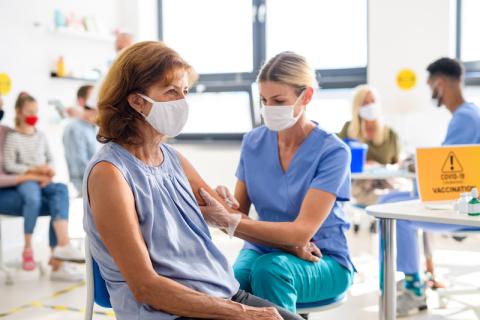
The team behind the MELODY study has shown that 23% of people with solid organ transplants, 21% of those with lymphoid malignancies and 14% of those with rare autoimmune rheumatic diseases have no detectable antibodies against COVID-19 despite three or more vaccine doses.
People with weakened immune systems are more at risk of severe outcomes from COVID-19, despite vaccination. Population-level studies have highlighted that those with solid organ transplants, lymphoid malignancies (such as lymphoma), and people on immunosuppressive medication have the highest risk of hospitalisation or death from COVID-19.
In the UK, these groups are prioritised for additional booster vaccinations and treatments for COVID-19. However, the groups defined are broad, and there is likely to be considerable variation of risk between individuals.
Mass antibody testing has not been implemented at population level in the UK or internationally, in part because it has not been established what level of antibodies correlates to protection from COVID-19. If a test were available that could tell individuals their risk of severe infection, this would help to refine approached to managing this risk.
The MELODY team set out to evaluate whether mass antibody testing (using a lateral flow immunoassay) could help to establish who was at risk of having no antibodies to fight COVID-19 after three or more vaccine doses.
Participants were identified and recruited via the NHS Blood and Transplant Registry for those who had received a solid organ transplant, and the National Disease Registration Service at NHS Digital for those with rare autoimmune rheumatic diseases or lymphoid malignancies. They received an antibody test to take at home, together with an online questionnaire.
In total, 23,036 people took the test, of whom 9,927 were solid organ transplant recipients, 6,516 had a rare autoimmune rheumatic disease, and 6,593 had a lymphoid malignancy.
The results, published as a preprint (and therefore not yet peer reviewed) showed that in all groups, higher antibody levels were associated with younger age, higher number of vaccine doses and previous COVID-19 infection. The likelihood of detectable antibody levels was lower in people on medication to suppress their immune system.
Two groups of people were found to have particularly low odds of having antibodies to fight COVID-19:
- People with a solid organ transplant who were taking an anti-proliferative agent, calcineurin inhibitor and steroid at the same time
- People taking anti-CD20 monoclonal antibodies (used to achieve B cell depletion in some diseases).
Subsequent vaccine doses reduced the proportion of people with no antibodies to fight COVID-19.
The researchers concluded that antibody testing could enable rapid identification of individuals who are most likely to benefit from additional COVID-19 interventions.
